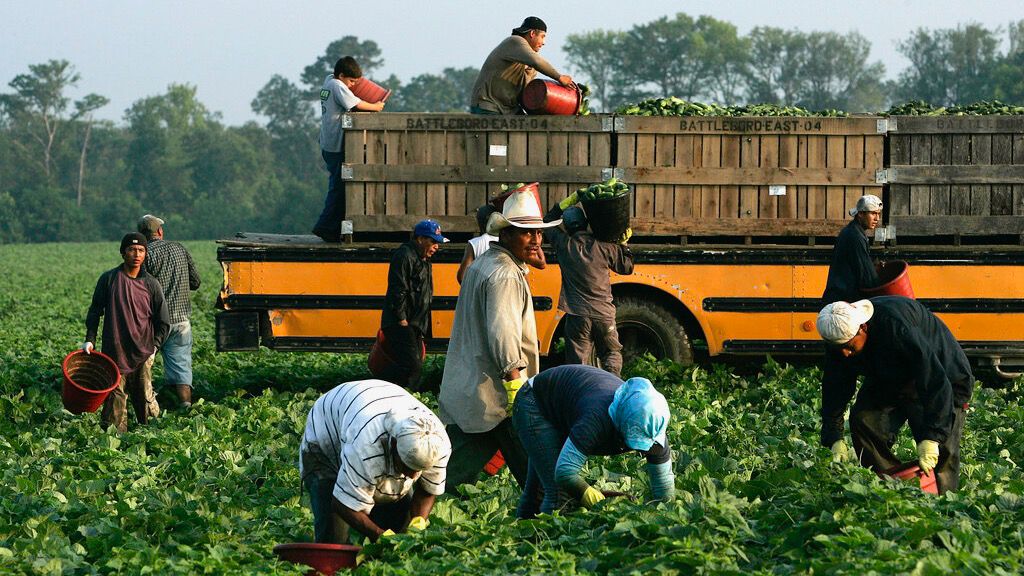As the 118th Congress prepares to negotiate the farm bill this year, a bipartisan group of lawmakers on Capitol Hill are reintroducing the Farm Workforce Modernization Act — legislation that seeks to boost foreign worker availability in the U.S., with benefits to both employers and laborers — in hopes the bill may finally have a vehicle to become law.
The bipartisan group, led by Rep. Zoe Lofgren, D-Calif., has 9 original co-sponsors, including Reps. Dan Newhouse, R-Wash., Jim Costa, D-Calif, Mike Simpson, R-Idaho, Jimmy Panetta, D-Calif., David Valadao, R-Calif., Salud Carbajal, D-Calif., John Duarte, R-Calif., Henry Cuellar, D-Texas, and Jerrold Nadler, D-N.Y. The bill, which has passed through the House twice already in past sessions, aims to create “a workforce solution for America's agriculture industry, one of the most critical sectors of the national economy.”
The Farm Workforce Modernization Act updates the H-2A agricultural guest worker program, and was negotiated for months back in 2019 with farmers, agriculture stakeholders, labor organizations, and farmworker advocates. Though it received strong bipartisan support in the 116th and 117th Congress, it failed to get enough votes in the Senate both times. The bill was filed quietly last week before Congress left town for the July 4th holiday.
“In the past few years, we’ve seen labor shortages contribute to high food prices. If it wasn’t obvious before, the pandemic made clear that our country’s agricultural workforce rules are in dire need of reform,” Lofgren said in a statement Friday. “The men and women who work America’s farms feed the nation. The Farm Workforce Modernization Act stabilizes the workforce, which will protect the future of our farms and our food supply. It’s well-past time we get this legislation that serves the best interests of our country to the President’s desk.”
According to a summary sheet obtained by Spectrum News, the bill would reform the H-2A program to provide more flexibility for employers while ensuring critical protections for workers.
For employers, the bill focuses on modifications to make the H-2A visa program more responsive and user-friendly and provides access to the program for industries with year-round labor needs. For workers, it would establish a program to choose to earn legal status through continued agricultural employment and contribution to the U.S. agricultural economy.
“The top concern for farmers and ranchers in Central Washington and across the nation is labor, and the problem is only getting worse. As a third-generation farmer, I know first-hand how challenging it is for the agriculture industry to hire and retain labor so we can continue to feed America and the world,” Newhouse said in a press release. “The Farm Workforce Modernization Act is the solution to creating a secure, reliable agriculture labor program to provide certainty to our farmers and ranchers for a stable and legal workforce for years to come.”
The bill comes on the heels of other bipartisan immigration legislation being introduced in the House in recent weeks, including the Dignity Act of 2023 and the Dream and Promise Act.
But one key hang up on the bill could be the Electronic Verification of the agricultural workforce component, also known as E-Verify. Per the summary, the bill “would establish a mandatory, nationwide E-Verify system for all agricultural employment, phased in after all legalization and H-2A reforms have been implemented, and including necessary due process protections for authorized workers who are incorrectly rejected by the system. This serves as the last necessary piece to ensure a legal workforce for the agricultural sector.”
Some members on both sides of the aisle have raised concerns about E-Verify in recent months, including Rep. Thomas Massie, R-Ky, who called it a “huge mistake” in a tweet. Massie voted against his own party’s Secure Our Border Act over the E-Verify provision, as did California Rep. John Duarte, making them the only two Republicans to reject the bill.
Duarte is a co-sponsor of the Farm Workforce Modernization act, and says he supports the addition of the E-Verify provision here because of the pathway to legal status not provided in the Protect our Border Act.
“I voted against H.R. 2 due to its stringent, unbalanced E-Verify program which would criminalize employers and hurt working families. Unlike H.R. 2, both the Farm Workforce Modernization Act and Dignity Act balance E-Verify with a sensible and flexible guest worker program, creating a pathway to legal status for guest workers while protecting employers,” said Duarte in a statement to Spectrum News.



